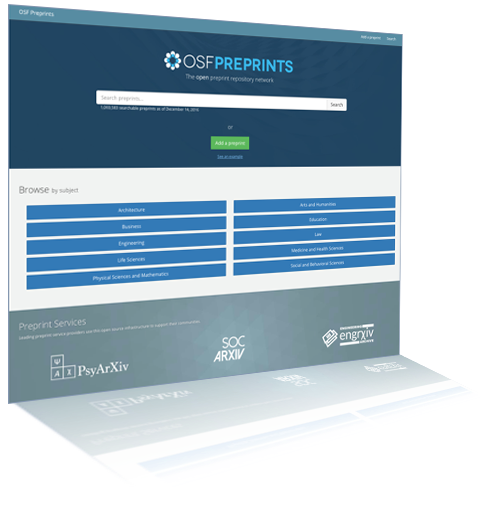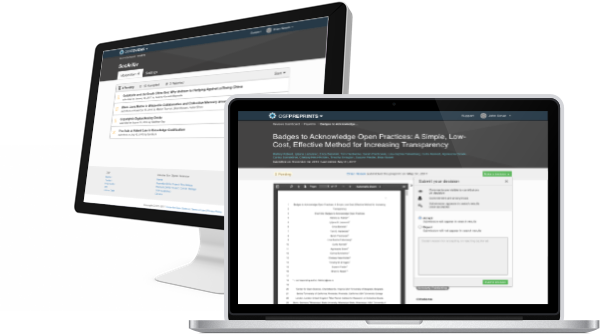

OSF Preprints is open source infrastructure for communities to advance open scholarship dissemination. It is built using the core OSF platform, connecting workflows for planning, sharing, reporting, and discovering research openly and transparently.
We developed OSF Preprints to meet these major goals:
Contact us for more information about setting up an OSF Preprint service.
OSF Preprints integrates OSF project infrastructure, allowing researchers to include supplemental data, materials, code or other information alongside their preprint. These files can be stored on OSF Storage or through connected services like Github, Dropbox, AmazonS3, Box, GoogleDrive, OwnCloud and others.


COS provides preprint hosting solutions to communities interested in building a preprint service for a specific discipline, research topic, geography or other commonality. The branded preprint services are built on OSF Preprints infrastructure, a shared toolset for file upload, sharing, persistence, and discovery.
These allow communities to focus their efforts on generating research, not on managing research infrastructure.
The service can be configured to match each organization's brand, editorial focus, licensing requirements, and taxonomy. Once configured, a new service can be up and collecting new preprints in a matter of days.

Preprint submissions to your service can be moderated for quality and compliance, either pre- or post-publication, to ensure the integrity of the content. Admins can enable one or more moderators to check for copyright, accuracy and fitness using your editorial policies. Authors and moderators both receive notifications on the status of any submission.
OSF Preprints is an open infrastructure made sustainable by a distributed cost model that leverages the diverse community of supporters interested in individual research communities or in support of open scholarship more generally. Preprints are a powerful form of open -access scholarship and are a key component of an open and transparent research lifecycle. They are also an exceptional value: communities hosted by OSF are currently able to provide these services for free to both researchers and readers.
Preprints accelerate the sharing of discoveries, improving transparency, collaboration, and reproducibility. Preprints are critical infrastructure for advancing research - fast, free, and accessible to all.

6218 Georgia Avenue NW, Suite #1, Unit 3189
Washington, DC 20011
Email: contact@cos.io

Unless otherwise noted, this site is licensed under a Creative Commons Attribution 4.0 International (CC BY 4.0) License.
Responsible stewards of your support
COS has earned top recognition from Charity Navigator and Candid (formerly GuideStar) for our financial transparency and accountability to our mission. COS and the OSF were also awarded SOC2 accreditation in 2023 after an independent assessment of our security and procedures by the American Institute of CPAs (AICPA).
We invite all of our sponsors, partners, and members of the community to learn more about how our organization operates, our impact, our financial performance, and our nonprofit status.